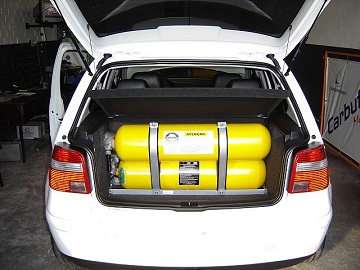The Presidential Compressed Natural Gas Initiative, an agency of the Federal Government, has revealed that Nigeria’s push towards alternative transportation fuels has attracted over $500m in investments and converted more than 50,000 vehicles to run on Compressed Natural Gas within its first year.
Dismissing a media report that claimed a slow rollout of CNG infrastructure across the country, the Programme Director and Chief Executive of PCNGI, Michael Oluwagbemi, described the claim as “alarmist” and “unreflective of the rapid progress” achieved under President Bola Tinubu’s administration.
In a statement issued on Monday, Oluwagbemi said the programme, which officially commenced in May 2024, has already created over 10,000 direct jobs and led to the establishment of 255 new vehicle conversion centres and 53 CNG dispensing daughter stations nationwide.
“We note the latest alarmist headlines on the fate of the thriving CNG sector by a sceptical section of the media. But such narratives ignore the incredible progress made in just seven months,” the statement read.
The PCNGI boss explained that the initiative was launched to incentivise the adoption of CNG and electric vehicles, facilitate investments in the alternative energy transport sector, and coordinate regulatory efforts to drive growth.
Oluwagbemi recounted that prior to May 2024, the adoption of CNG in Nigeria was virtually non-existent, with only 11 CNG stations nationwide, remnants of a pilot scheme initiated by the Nigerian National Petroleum Company Limited in 2017.
He said public interest was low and misinformation about CNG use was widespread. But a year later, the story has changed dramatically, according to him.
“From May 2024, the PCNGI set out to implement its mandate in line with the directive and vision of Mr President, which was to: Incentive the adoption of CNG and EV vehicles to ensure sustainable transportation for all Nigerians, facilitate investments into the alternative energy sector for transportation and coordinate regulation of the emerging sector for rapid growth.
“Because the initial desire of the President was greeted with scepticism, the start-up work of the PCNGI was to embark on an intensive awareness campaign which was conducted from May to October 2024; hardly any CNG vehicles were on our roads and no demand at the few eleven CNG stations nationwide since a 2017 pilot by NNPCL,” he stated.
The PCNGI boss said many, even the most ardent adherents, were not convinced anyone would want CNG vehicles, stressing that misinformation and fake news on CNG dominated the media space.
“In one year, the CNG sector has attracted over $500m in investments and created over 10,000 direct jobs. 255 new conversion centres that didn’t exist last year and 53 daughter stations exist today as a result of some of those investments.
“One year out, we are pleased that even the doubting Thomases are singing a new tune. With over 50,000 vehicles and rising to 100,000, the queues at CNG stations are naturally going to rise because of such an unprecedented increase (from a mere 4,000) in vehicle count as a result of massive incentives provided by the administration and the breakthrough in awareness due to the economic benefits of the switch.
“Nigerians love CNG, and the programme is working. With over 50,000 converted vehicles on Nigerian roads, and projections to hit 100,000 soon, it is expected that CNG station queues will grow due to the unprecedented rise in demand,” Oluwagbemi stated.
According to the PCNGI, the private sector has been pivotal in expanding infrastructure. Two new CNG daughter stations were inaugurated last week in Abuja by AY Shafa and Femadec, both of which are targeting 30 additional stations between them over the next year.
Femadec is also leading efforts to build CNG ecosystems in 20 universities. Greenville, another key investor, is rolling out 51 liquefied compressed natural gas stations across the North and South-East regions, including remote areas like Yola. Other planned site activations include Port Harcourt, Ado-Ekiti, Lokoja, Aba, Enugu, and Abuja, expected to go live within the next two to four months.
“In Ilorin, the launch of a refuelling initiative transformed the local economy. We are replicating that model nationwide,” Oluwagbemi stated.
NNPCL is also ramping up its infrastructure, expanding from 12 to 20 CNG stations, with 40 more expected in the second phase of its rollout. Bovas is launching two modern CNG sites in Ibadan, while NIPCO plans to complete eight new stations in addition to the 23 currently operational.
Further boosting confidence in the sector, the Midstream and Downstream Gas Infrastructure Fund recently awarded equity investments to 10 new project developers. Three of these investments are targeted at CNG station development, adding to the N123bn previously invested by the fund last year.
Despite these strides, Oluwagbemi urged Nigerians to be patient, noting that large-scale energy transitions take time. “It took over 70 years for Nigeria to become addicted to petrol and diesel. It will take more than seven months to wean ourselves off it,” he said.
He criticised a recent report for allegedly downplaying progress and promoting a “negative narrative” about CNG infrastructure. “We doubt anyone would want to switch a bi-fuel vehicle, already running on both CNG and petrol, back to petrol only,” he said, adding that CNG use can reduce fuel costs by as much as 90 per cent in some journeys.
Reiterating the government’s commitment to the CNG transition, Oluwagbemi said the PCNGI is working across the value chain to ensure that President Tinubu’s promises to Nigerians are fulfilled.
“Nigeria is making progress with respect to CNG infrastructure but engineering feats take time. It took over seventy years to get addicted to petrol and diesel, it will take more than seven months to be weaned off the addiction,” he stated.















